初一英语语法重点.pdf
【精编版】初中英语基础知识(知识点)合集.pdf
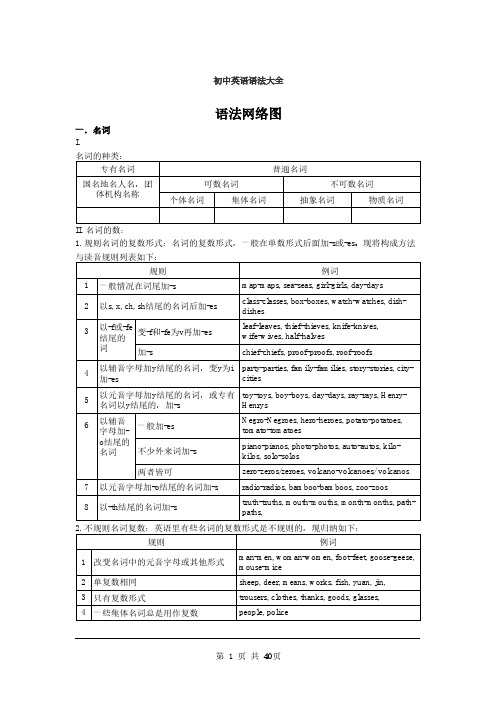
初中英语语法大全语法网络图一.名词I.II. 名词的数:1. 规则名词的复数形式:名词的复数形式,一般在单数形式后面加-s或-es。
现将构成方法III. 名词的所有格:名词在句中表示所有关系的语法形式叫做名词所有格。
所有格分两种:一是名词词尾加’s 构成,二是由介词of加名词构成。
前者多表示有生命的东西,后者多表示无生命的东西。
3. of所有格的用法:用于无生命的东西:the legs of the chair, the cover of the book用于有生命的东西,尤其是有较长定语时:the classrooms of the first-year students 用于名词化的词:the struggle of the oppressed二.冠词冠词分为不定冠词(a, an),定冠词(the),和零冠词。
I.三.代词:I.II. 不定代词用法注意点:1. one, some与any:1) one可以泛指任何人,也可特指,复数为ones。
some多用于肯定句,any多用于疑问句和否定句。
One should learn to think of others.Have you any bookmarks? No, I don’t have any bookmarks.I have some questions to ask.2) some可用于疑问句中,表示盼望得到肯定的答复,或者表示建议,请求等。
Would you like some bananas?Could you give me some money?3) some 和any修饰可数名词单数时,some表示某个,any表示任何一个。
I have read this article in some magazine.Please correct the mistakes, if any.4) some和数词连用表示“大约”,any可与比较级连用表示程度。
(完整word版)初中英语语法大框架.pdf

简单介词、从属连词
表示说话时的感 情或口气
句类 句子种类 (Sentence Types )
名称
定义
陈述 句
说明一个事实或陈述说话人的看 法
疑问 提出问题 句
祈使 表示请求、命令、劝告、建议等 句
感叹 句
表示喜怒哀乐等强烈的情感
简单 句
只有一套主、谓语的句子
并列 句
由两个及以上并列而又互相独立 的简单句构成
复合 由一个主句和至少一个从句构成 句
分类 肯定句、否定句 一般疑问句、选择疑问句、反意疑问句、 特殊疑问句等
主语从句、表语从句、宾语从句、定语从 句、状语从句等
(conjunction) 独 立 担 任 任 感叹词 interj. 何 (interjection) 成 分)
词类 ( Parts of Speech )
定义 表示人或事物的 名称 代替名词、形容词 或数词
表示数量或顺序
专有名词、普通名词
分类
人称代词、物主代词、反身代词、相互代词、指示 代词、疑问代词、不定代词、关系代词、连接代词 基数词、序数词
词类和句类
词类
汉(英)语名称
名词 n. (noun) 实 词 代词 pron. (在 (pronoun) 句 数词 num. 子 (numeral) 中 独 动词 v. (verb) 立 形容词 adj. 担 (adjective) 任 成 分) 副词 adv. (adverb)
虚 冠词 art. (article) 词 (不 能 介词 prep. 在 (preposition) 句 子 连词 conj. 中
表示动作或状态
表示名词 (人或物 ) 的特征 修饰动词、形容 词、其他副词或全 句,表示状态特征 或行为
英语语法大全.pdf
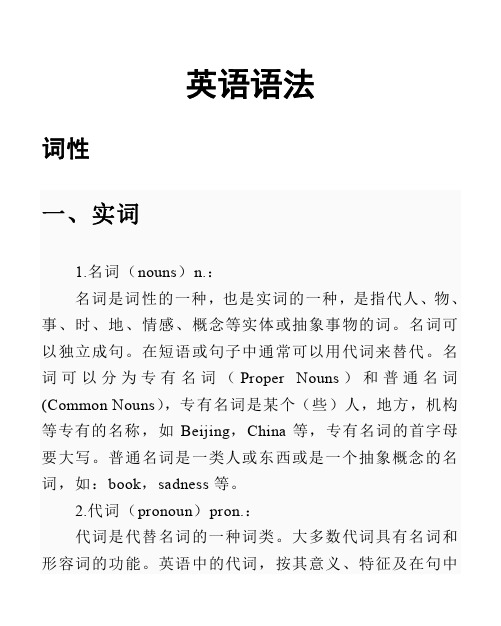
英语语法词性一、实词1.名词(nouns)n.:名词是词性的一种,也是实词的一种,是指代人、物、事、时、地、情感、概念等实体或抽象事物的词。
名词可以独立成句。
在短语或句子中通常可以用代词来替代。
名词可以分为专有名词(Proper Nouns)和普通名词(Common Nouns),专有名词是某个(些)人,地方,机构等专有的名称,如Beijing,China等,专有名词的首字母要大写。
普通名词是一类人或东西或是一个抽象概念的名词,如:book,sadness等。
2.代词(pronoun)pron.:代词是代替名词的一种词类。
大多数代词具有名词和形容词的功能。
英语中的代词,按其意义、特征及在句中的作用分为:人称代词、物主代词、指示代词、反身代词、相互代词、疑问代词、关系代词、连接代词和不定代词九种。
3.数词(numeral)Num.:表示“多少”和“第几”的词,叫数词。
其用法相当于名词或者形容词。
数词分为基数词和序数词两种。
4.形容词(adjective)adj.或a.:很多语言中均有的主要词类中的一种。
主要用来修饰名词的词,表示事物的特征。
形容词用来修饰名词或代词,表示人或事物的性质、状态,和特征的程度好坏,与否。
5.副词(adverb)adv.:是一种用来修饰动词、形容词、全句的词,说明时间、地点、程度、方式等概念的词。
副词是一种半虚半实的词。
副词可分为:时间副词、地点副词、方式副词、程度副词、疑问副词、连接副词、关系副词、频率副词和说明性副词等。
6.动词(Verb)v.:动词,就是用来形容或表示各类动作的词汇。
基本上每个完整的句子都有一个动词,要表示第二个动作时可使用不定词、动名词、对等连接词、从属连接词或增加子句等方法连结。
二、虚词7.冠词(article) art.:冠词是虚词,本身不能单独使用,也没有词义,它用在名词的前面,帮助指明名词的含义。
冠词可以说是名词的一种标志,它不能离开名词而独立存在。
初一英语语法汇总

初一语法汇总第一讲:时态总复习时态肯定句否定句一般疑问句动词变化一现dodoesdon’t dodoesn’t doDo you do sth?Does he do sth?1)+s2)+es(s,sh.ch,x,o)3)辅+y→ies4)have→has一过did didn’t do Did you do sth?规则变化1)直+ed2)去e+ed3)双+ed4)改y→ied(辅y)不规则变化1)AAA2)ABB3)ABC4)ABA5)AAB现完have/has done have/has+not+doneHave you done sth?Has he done sth?现进am/is/are+doingam/is are+not+doingAre you doing sth?1)直+ing2)去e+ing3)双+ing(辅元辅)4)改ie→y+ing过进was/were+doingwas/were+not+doingWere you doing sth?语态复习构成be done主动句变被动句一现am/is/are+done例句:Judy caught Nick.被动:Nick was caught by Judy.1.找:找主语和宾语2.换:主宾调换位置3.改:谓语改be done4.加:加上by 口诀:主变宾,宾变主,谓变be done时不变。
数格随被变,还有by放于宾格前。
一过was/were+done现完have/has+been+done现进am/is/are+being+done过进was/were+being+done第二讲:一般将来时Captain Charles Alison will sail from Portsmouth tomorrow.We shall meet him at the harbour early in the morning.He will be in his small boat,Topsail.Captain Alison will set out at eight o'clock so we shall have plenty of time.We shall see his boat and then we shall say good-bye to him.He will be away for two months.He will take part in an important race across the Atlantic.2.定义:将要发生或者打算要做的事情。
初中英语语法大全.pdf

1 (see 、hear 、notice 、find 、feel 、listen to 、 look at (感官动词)+do eg:I like watching monkeys jump2 (比较级 and 比较级)表示越来越怎么样3 a piece of cake =easy 小菜一碟(容易)4 agree with sb 赞成某人5 all kinds of 各种各样 a kind of 一样6 all over the world = the whole world 整个世界7 along with同……一道,伴随…… eg : I will go along with you我将和你一起去the students planted trees along with their teachers 学生同老师们一起种树8 As soon as 一怎么样就怎么样9 as you can see 你是知道的10 ask for ……求助向…要…(直接接想要的东西) eg : ask you for my book11 ask sb for sth 向某人什么12 ask sb to do sth 询问某人某事 ask sb not to do 叫某人不要做某事13 at the age of 在……岁时 eg:I am sixteen I am at the age of sixteen14 at the beginning of …………的起初;……的开始15 at the end of +地点/+时间最后;尽头;末尾 eg : At the end of the day16 at this time of year 在每年的这个时候17 be /feel confident of sth /that clause +从句感觉/对什么有信心,自信eg : I am / feel confident of my spoken English I feel that I can pass the test18 be + doing 表:1 现在进行时 2 将来时19 be able to (+ v 原) = can (+ v 原)能够…… eg : She is able to sing She can sing20 be able to do sth 能够干什么 eg :she is able to sing21 be afraid to do (of sth 恐惧,害怕…… eg : I'm afraed to go out at night I'm afraidof dog 22 be allowed to do 被允许做什么eg: I'm allowed to watch TV 我被允许看电视 I should be allowed to watch TV 我应该被允许看电视23 be angry with sb 生某人的气 eg : Don't be angry with me24 be angry with(at) sb for doing sth 为什么而生某人的气25 be as…原级…as 和什么一样 eg : She is as tall as me 她和我一样高26 be ashamed to27 be away from 远离28 be away from 从……离开29 be bad for 对什么有害 eg : Reading books in the sun is bad for your eyes 在太阳下看书对你的眼睛不好30 be born 出生于31 be busy doing sth 忙于做什么事 be busy with sth 忙于…… 32 be careful 当心;小心33 be different from……和什么不一样34 be famous for 以……著名35 be friendly to sb 对某人友好36 be from = come from 来自 eg :He is from Bejing He comes from Bejing Is he from BejingDoes he come from Bejing37 be full of 装满……的 be filled with 充满 eg: the glass is full of water the glass isfilled with water38 be glad+to+do/从句39 be going to + v(原)将来时40 be good at(+doing) = do well in 在某方面善长, 善于…… 41 be good for 对什么有好处 eg : Reading aloud is good for your English42 be happy to do 很高兴做某事43 be helpful to sb 对某人有好处eg : Reading aloud is helpful to you 大声朗读对你有好处Exercising is helpful to your bady 锻炼对你的身体有好处44 be in good health 身体健康45 be in trouble 处于困难中 eg : She is in trouble They are in tronble46 be interested in 对某方面感兴趣47 be late for = come late to 迟到 eg: Be late for class 上课迟到48 be like 像…… eg : I'm like my mother49 be mad at 生某人的气50 be made from 由……制成(制成以后看不见原材料)51 be made of 由……制成(制成以后还看得见原材料) 52 be not sure 表不确定53 be on a visit to 参观54 be popular with sb 受某人欢迎55 be quiet 安静56 be short for 表**的缩写 eg: 陶 is short for 陶俊杰57 be sick in bed 生病在床58 be sorry to do sth be sorry for sb eg : I am sorry for you59 be sorry to hear that 60 be sorry to trouble sb eg : I am sorry to trouble you61 be strict in doing sth 严于做某事 eg : He's strict in obeying noles62 be strict with sb 对某人要求严格 eg: Some students are not strict with them selves 这些学生对自己不严格63 be strict with sb in sth 某方面对某人严格64 be supposed to do 被要求干什么65 be sure 表确定66 be sure of doing sth 对做某事有信心 eg: He is sure of winning I am s ure of learning English well67 be sure of sth 对做某事有信心 eg: I'm sure of my head (my teacher 我相信我的大脑(老师)68 be sure that sth 对做某事有信心 eg: I'm suer that he can pass the test 我相信他能通过考试69 be sure to do sth一定会做某事eg: We are sure to pass the test 我们一定会通过这次考试 We are sure to learn English well 我们一定能学好英语70 be terrified of + 名/动doing 害怕…… 71 be terrified to do sth 害怕做某事72 be the same as …和什么一样。
七年级全册英语语法大全
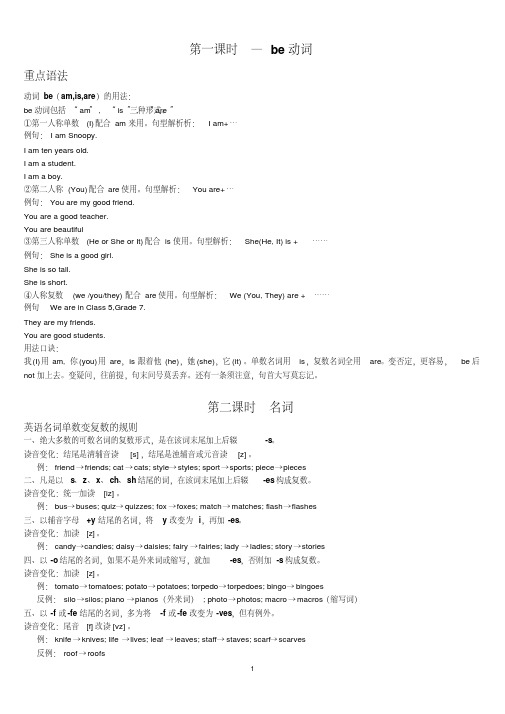
We (You, They) are +
……
They are my friends. You are good students. 用法口诀: 我 (I) 用 am, 你 (you) 用 are,is 跟着他 (he),她 (she),它 (it) 。单数名词用
is ,复数名词全用
are。变否定,更容易,
十九、若表达具体数目,要借助数量词 例: pair( 对,双 ); suit( 套 ); a pair of glasses; two pairs of trousers
二十、另外还有一些名词,其复数形式有时可表示特别意思, 例: goods 货物, waters 水域, fishes(各种)鱼
二十一、除人民币元、角、分外,美元、英镑、法郎等都有复数形式。
例: fish → fish; sheep→ sheep; cattle→ cattle; deer→ deer; salmon→ salmon 十二、极少数单词,其复数形式没有任何规律。 读音变化:没有规律。
例: man→ men; woman →women; child →children; person → people; ox → oxen 十三、一些单数词得加 en 才能变成复数词:
形容词性物主代词 (my/your/his/her/its/our/their)+ 名词 而名词性物主代词则相当于形容词性物主代词 +名词 ,故其后不必加名词。如:
Is this your book?
No,, it isn?t, it?s hers(her book) This pen is mine.
1.in; on; at 用在时间词前,表“在”
第四课时 介词知识点
英语语法基础知识大全(2020年7月整理).pdf
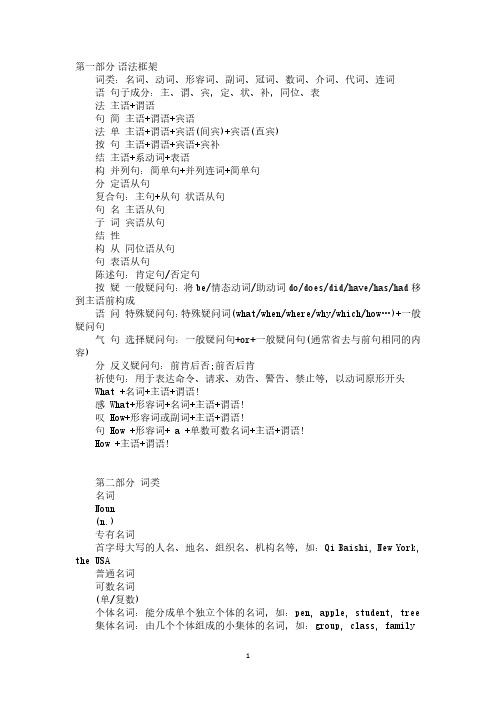
到主语前构成 语 问 特殊疑问句:特殊疑问词(what/when/where/why/which/how…)+一般
疑问句 气 句 选择疑问句:一般疑问句+or+一般疑问句(通常省去与前句相同的内
容) 分 反义疑问句:前肯后否;前否后肯 祈使句:用于表达命令、请求、劝告、警告、禁止等,以动词原形开头 What +名词+主语+谓语! 感 What+形容词+名词+主语+谓语! 叹 How+形容词或副词+主语+谓语! 句 How +形容词+ a +单数可数名词+主语+谓语! How +主语+谓语!
(1)“as +形容词或副词原级+as+被比较对象”结构。例句: He studies as hard as you. 他像你一样学习努力。
(2)在否定句或疑问句中可用 not so…as…. 例句:He can notrun so/as fast as you. 他没你跑得快。
【精品】初一英语语法总结
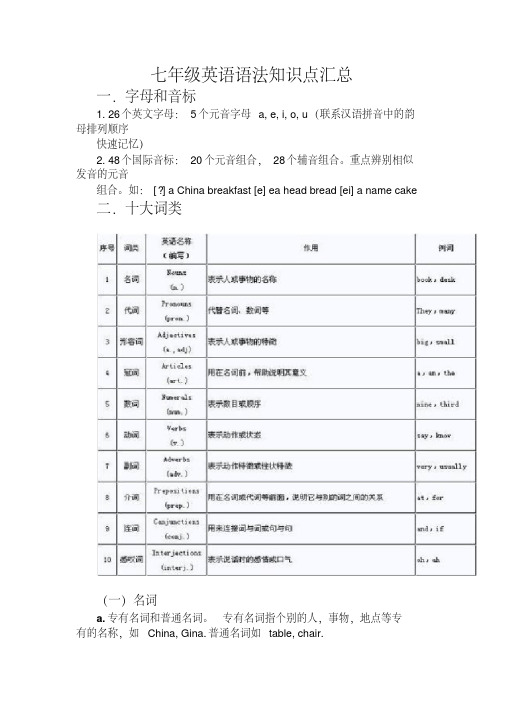
七年级英语语法知识点汇总一.字母和音标1. 26个英文字母:5个元音字母a, e, i, o, u (联系汉语拼音中的韵母排列顺序快速记忆)2. 48个国际音标:20个元音组合,28个辅音组合。
重点辨别相似发音的元音组合。
如:[?] a China breakfast [e] ea head bread [ei] a name cake 二.十大词类(一)名词a. 专有名词和普通名词。
专有名词指个别的人,事物,地点等专有的名称,如China, Gina. 普通名词如table, chair.b. 可数名词和不可数名词:可数名词有复数形式,如an apple,two apples. 不可数名词一般没有复数形式,如milk, bread, rice.[重点]可数名词的复数变形:有规则变化和不规则变化两种规则变化:1一般情况直接在词尾加“-s”, 如: bag-bags, day-days, boy-boys, key-keys等。
○2以s, x, sh, ch结尾的单词,要在词尾加“-es”, 如: bus-buses, watch-watches, ○box-boxes等。
3以辅音字母加y结尾的单词,要变y为i再加“-es”, 如:baby-babies, ○country-countries, family-families等。
如:knife-knives, half-4部分以 f (e)结尾的单词,要变 f (e)为“ves”,halves等。
○顺口溜:小偷(thief)的妻子(wife),为了自己(self)保命(life),站到架子上(shelf),用树叶(leaf)做的小刀(knife),将狼(wolf)劈成了两半(half)如:○有生命的加“-es”,结尾的单词,没有生命的加“-s”,5以字母“o”zoo-zoos, photo-photos, tomato-tomatoes.口诀:黑人(Negro)英雄(hero)爱在火山(volcano)吃土豆(potato)西红柿(tomato)不规则变化:1改变单数名词中的元音字母:○man-men, woman-women, foot-feet, tooth-teeth等。
- 1、下载文档前请自行甄别文档内容的完整性,平台不提供额外的编辑、内容补充、找答案等附加服务。
- 2、"仅部分预览"的文档,不可在线预览部分如存在完整性等问题,可反馈申请退款(可完整预览的文档不适用该条件!)。
- 3、如文档侵犯您的权益,请联系客服反馈,我们会尽快为您处理(人工客服工作时间:9:00-18:30)。
1.
主格: I we you she he it they
: me us you her him it them
:my our your her his its their
: mine ours yours hers his its theirs
2.形容词和副词的比较级
(1) 一般在形容词或副词后+er
older taller longer stronger, etc
(2) 多音节词前+more
more interesting, etc.
(3) 双写最后一个字母,再+er
bigger fatter, etc.
(4) 把y变i,再+er
heavier, earlier
(5) 不规则变化:
well-better, much/many-more, etc.
3.可数词的复数形式
Most nouns + s a book –books
Nouns ending in a consonant +y - y+ ies a story—stories
Nouns ending in s, sh, ch or x + es a glass—glasses a watch-watches Nouns ending in o +s or +es a piano—pianos a mango—mangoes
Nouns ending in f or fe - f or fe +ves a knife –knives a shelf-shelves
4. (单复数形式不变)
bread, rice, water ,juice etc.
5. 缩略形式
I’m = I am you’re = you are she’s = she is he’s = he is
it’s = it is who’s =who is can’t =can not isn’t=is not etc
6. a/an
a book, a peach
an egg an hour
7. Preposition:
on, in ,in front of, between, next to, near, beside, at, behind.
表示时间:at six o’clock, at Christmas, at breakfast
on Monday on 15th July On National Day
in the evening in December in winter
8.和
one – first two-second twenty-twentieth
9. Some /any
I have some toys in my bedroom.
Do you have any brothers or sisters?
10. be 动词
(1) Basic form: am/are/is
(2) 肯定和I am(not) from London.
My eyes are(not) small.
My hair is(not) long.
(3):Am I a Chniese? Yes, you are. No, you aren’t.
Are they American? Yes, they are. No, they aren’t.
Is t he cat fat? Yes, it is. No, it isn’t.
11. there be 结构
肯定句:There is a …
There are …
一般疑问句:Is there …? Yes, there is./ No, there isn’t.
Are there…? Yes, there are. /No, there aren’t.
否定句:There isn’t …. There aren’t….
12.
Sit down please
Don’t sit down, please.
13..通常用“now”.
形式: be + verb +ing
eg: I am(not) doing my homework.
You/We/They are(not) reading.
He/She/It is(not) eating.
动词—ing 的形式
Most verbs +ing walk—walking
Verbs ending in e -e + ing come—coming
Short verbs ending in a vowel + a consonant run –running swim—swimming
14。
通常用“usually, often, every day, sometimes”。
形式:
肯定句:
I go to school on foot every day.
She goes to school on foot every day。
